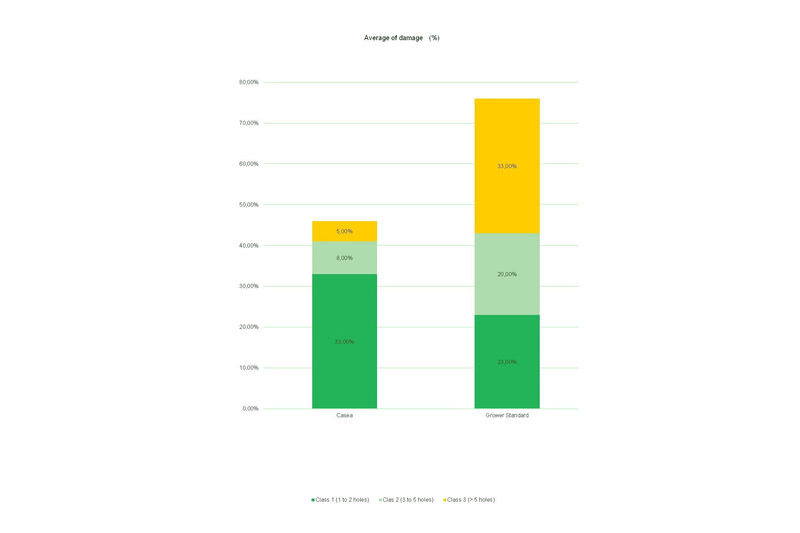Now that the data has been collected and the numbers have been crunched, it is time to reflect on the 2023 European outdoor trial season. With over 100 trials with 20 different product combinations in 7 countries, there are plenty of exciting results to share. Market Development Manager Felipe Mendonça takes us through the highlights and gives a preview of what comes next.
During the 2023 outdoor trial season, growers in France, Italy, the Netherlands, Poland and Spain entrusted us with a few or even a single hectare to learn what biological crop protection can do for them. Throughout the year, they followed our protocols for a range of products, from biofungicides to natural enemies. And at each stage of the crop’s development, growers had the opportunity to observe firsthand the effects of our products on their harvest.
The power of trials
With the arrival of the new year, almost all the results were in. Market Development Manager Felipe Mendonça looks back on a fruitful season. 'When growers decide to participate in our trials, they can trust that we have already thoroughly tested the product in the lab and in the field,' says Felipe. 'We expect each of our products to add value; the trials demonstrate exactly how much value our products add, in a wide range of conditions that you simply cannot reproduce in the lab. That is what is so powerful about these trials.’
Small changes, big impact
Over the summer, growers saw early successes with the use of biofungicide Trianum in a wide range of crops. In fields treated with Trianum, there were few early symptoms of Rhizoctonia in potato. Over the next few weeks, Trianum continued to prove its worth, explains Felipe. In the end, the occurrence of Rhizoctonia in fields treated with Trianum was just 9.4% compared to 19.2% in fields treated with conventional solutions, resulting in a higher quality harvest.
By fall, the tomato harvest had come to a close, and results of the trials with Trianum against soil diseases in tomato trickled in. 'The biggest takeaway of these trials is that small changes can have a big impact,' says Felipe. 'The measurement of dissolved solids in the tomato fruit, known as the Brix rating, improved, fruits weighed on average 5 grammes more, and there were fewer plant losses. These small gains add up quickly when you're growing a thousands of plants per hectare and as a result, the return on investment was very positive.’
Defying expectations
As conventional solutions against mealybugs in field crops are being phased out, there is an urgent need for biological alternatives. The trials with Citripar and Cryptobug, Koppert's solutions for the prevention and control of mealybugs in grape and citrus, gives growers cause for optimism, says Felipe. 'We have had good experiences with the combination of Citripar, a parasitic wasp, and Cryptobug, a predatory beetle, against mealybugs. Still, the trials exceeded our expectations. We observed highly infested areas with large populations of mealybugs return to normal. Citripar made an early impact by parasitizing the larvae and reducing their numbers, while Cryptobug helped control mealybugs at all developmental stages. The fact that these solutions can be integrated into an IPM system and combined with conventional solutions is very good news for growers.’
Trial by fire
Wireworms are the enemy of the developing potato tuber, leaving holes and reducing the quality of the product. Koppert's Casea beneficial nematodes were put to work in highly infested soil. 'It was truly a trial by fire,' says Felipe. ‘Wireworms are a difficult pest to control, particularly in historically affected areas. Getting rid of wireworms is a multi-year process of restoring microbiological soil health. Even halfway through the growing season, there was evidence of our Casea solution doing just that. As we increased the population of beneficial nematodes in the soil, damage to the tubers decreased. While not a silver bullet, we found that Casea is much more effective than any chemical solution available today. In the field treated with Casea, we observed a decrease in tuber damage of 30 percentage points compared to the untreated field. That makes a huge difference to our customers. With each season, we expect soil health to improve and issues with wireworms to go down.’

An exciting first season
'In 2023, we focused on some of the most common pest and disease challenges facing growers in Europe today, as well as a number of local challenges,’ says Felipe. 'We are already preparing for the next trial season, which will feature more countries and more solutions for a greater variety of crops. Like a biofungicide for seed treatment in wheat, micro-organisms to improve soil health in corn and soybean, and our predatory mites against spider mites in tomato, citrus and apple. We look forward to demonstrating the value that our solutions can add.’